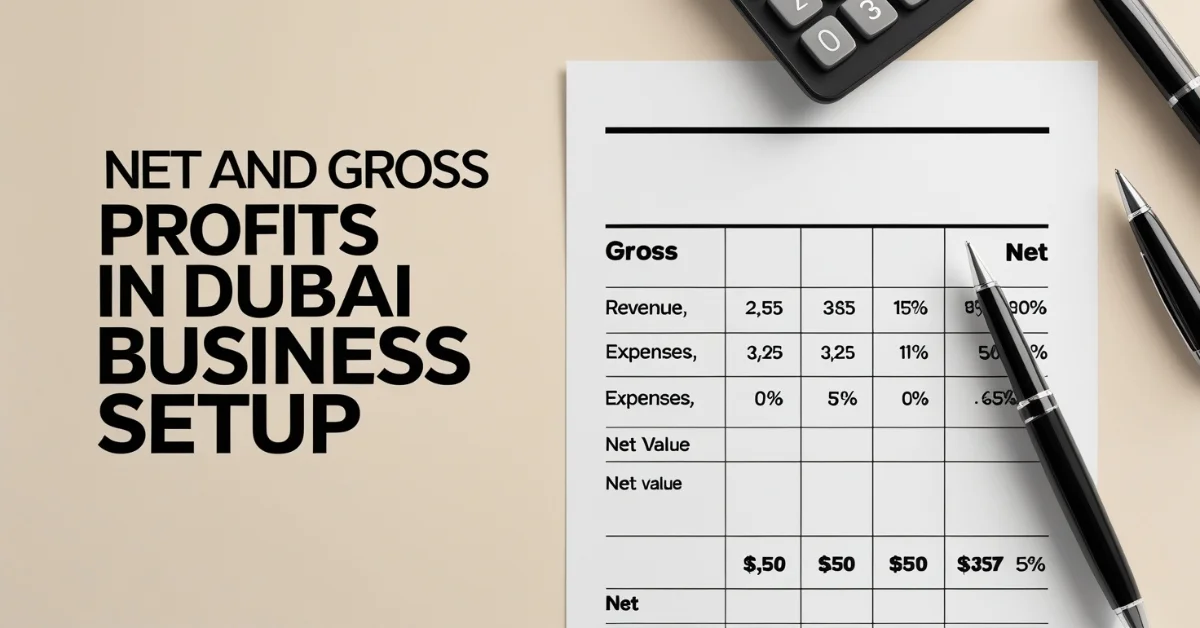
When starting a business in Dubai, understanding financial terms like Net and Gross is more than helpful; it’s critical. These two concepts define how your business will measure success, plan for the future, and attract investors. Whether you’re launching in a free zone or on the mainland, knowing the difference between Net and Gross can guide every major decision you make.
What Is Gross?
Gross refers to the total earnings or revenue your business generates before any expenses are deducted. It reflects the effectiveness of your sales and the efficiency of your operations. In simple terms, Gross is what your company brings in before paying for salaries, rent, utilities, or other operating costs.
What Is Net?
Net is the remaining amount after all business expenses have been deducted from the gross total. It represents the actual earnings your business retains and is often called the bottom line. This is what most business owners, investors, and auditors pay close attention to.
Difference Between Net and Gross
Although Net and Gross are closely related, they tell completely different stories.
|
Term |
Definition |
Significance in Business |
|
Gross |
Total revenue before expenses |
Shows potential and scale |
|
Net |
Revenue after deducting all expenses |
Shows real profitability |
Net Profit vs Gross Profit
While some people use these terms interchangeably, they aren’t the same. Understanding this distinction helps you manage pricing, budgeting, and forecasting in Dubai’s competitive market. Gross profit focuses only on direct costs like materials or labor, while Net profit accounts for all overheads, taxes, and fees.
- Gross shows operational success
- The net shows financial health
Net and Gross in Salary Context
In Dubai, the terms Net and Gross aren’t just used for businesses—they are also very important when it comes to salaries. Whether you’re an employer offering a job or an employee accepting one, understanding the difference between gross salary and net salary can prevent confusion and ensure transparency.
1. What is Gross Salary?
Gross salary refers to the full amount stated in your employment contract before any deductions are applied. It includes the full monthly or annual payment promised by the employer, and may also cover benefits like housing, transport, or bonuses.
2. What is Net Salary?
Net salary is the final amount deposited into your bank account after all necessary deductions. These deductions could include pension contributions (for UAE nationals), unpaid leave, or any optional benefits you’ve selected.
Difference Between Net and Gross Salary
Understanding the difference between net and gross salary is essential for both employers and employees in Dubai. Here are several important points to help you fully grasp the distinction:
1. Definition Clarity
- Gross Salary: the total amount mentioned in your employment contract before any deductions like taxes or benefits. It represents your full earning potential.
- Net salary: the actual amount credited to your bank account after all deductions are made. It reflects your actual take-home pay.
2. Components Included
Understanding what goes into gross and net figures is vital for accurate financial planning.
- Gross includes the total income or revenue before deductions. In business, this might be total sales or earnings before expenses. In salary, it includes basic pay, allowances, and bonuses.
- Net is what’s left after subtracting all costs, such as taxes, operational expenses, social security (for UAE nationals), unpaid leaves, or salary advances in the case of employees.
3. Salary Negotiation
Make sure to confirm whether the salary discussed is gross or net during contract negotiations. This helps avoid misunderstandings and ensures you know exactly how much you’ll take home each month.
4. Impact on Financial Planning:
- Net salary is crucial for budgeting as it reflects your actual income. It helps you plan monthly expenses, manage savings, and make smart investment decisions based on your real take-home pay.
- Gross salary is important for determining your total annual income, calculating end-of-service benefits like gratuity, and assessing your eligibility for loans, credit cards, or rental agreements, as it reflects your full earning potential.
5. UAE National vs. Expatriate Differences:
1. Dedications for UAE Nationals
UAE nationals may have deductions from their gross salary for pension schemes, with a typical 5% contribution from the employee’s side. This affects the net salary received each month.
2. Expatriate Salary Structure
Expatriates in the UAE typically receive their full gross salary without government deductions. However, company-specific deductions like salary advances or penalties may still apply, affecting the final net salary.
3. Payroll Transparency
Companies in Dubai are encouraged to provide clear payslips that detail gross salary, all deductions, and the final net salary. This transparency helps employees understand their earnings and prevents salary-related disputes.
6. Tax-Free Nature of UAE
The UAE imposes no personal income tax, so for many employees—especially expatriates—the difference between gross and net salary is minimal, making the full salary package more beneficial and straightforward.
7. End-of-Service Benefits
In the UAE, gross salary is a crucial factor in calculating end-of-service gratuity. It is used as the basis for calculating the amount an employee is entitled to receive upon completing their service term.
4. Net Salary in Gratuity
Net salary is not used in gratuity calculations. Only the gross salary, particularly the basic salary portion, is considered when determining end-of-service benefits in the UAE.
8. Employer Contributions
Many employers in the UAE provide additional benefits such as health insurance, housing, or annual flight tickets. These may not be included in the gross salary but significantly enhance the total compensation package and overall employee value.
9. Cost-to-Company (CTC)
Gross salary typically forms part of the larger Cost to Company (CTC) package. CTC often includes additional elements such as yearly bonuses, flight allowances, education support, and various other perks, providing a full picture of the employee’s total compensation.
Understanding the Basics of Net and Gross in Business
Dubai’s business-friendly environment offers great opportunities, but long-term success depends on smart financial management. Every business owner should clearly understand how gross and net amounts differ. Gross income reflects the total revenue before any deductions, while net income shows what remains after all costs are subtracted.
In Dubai, whether you set up your business in a Free Zone or on the Mainland can significantly affect both your gross and net financial outcomes. Each setup comes with its own cost structure, compliance requirements, and operational flexibility. By clearly understanding these terms, business owners can:
- Set realistic financial goals by knowing true profitability
- Track business performance using accurate revenue vs. expense comparisons
- Prepare for audits and compliance with clear, transparent financial records
- Net and Gross Differences Between Mainland and Free Zone Businesses
Free Zone
Free zones are established to appeal to international investors by offering simplified processes and financial benefits:
- Lower setup and operating costs
- Fewer compliance and regulatory requirements
- Gross income often stays higher due to reduced overhead
- Easier to achieve stronger net profits because expenses are minimal
Mainland
Mainland businesses offer greater flexibility in terms of operating across the UAE and dealing directly with the local market:
- More options for expansion and growth
- May involve higher setup and ongoing costs
- More regulatory responsibilities (e.g., labor laws, rent, local partners)
- Net profit can be affected by added operational and compliance costs
Tracking Net and Gross for Business Growth in Dubai

To grow a successful business in Dubai’s competitive market, consistently tracking your net and gross figures is essential. Gross revenue shows how much you’re earning, while net profit reveals your actual business health after expenses. Accurate tracking ensures better financial planning, helps attract investors, and keeps you compliant with UAE regulations. Regular monitoring helps you:
- Adjust pricing strategies to improve revenue
- Identify and reduce unnecessary costs
- Make data-driven decisions for sustainable growth
1. Recommended Tools
To manage your financial metrics effectively, consider using these trusted accounting platforms:
- Zoho Books provides UAE-based SMEs with VAT-compliant features tailored for local regulations
- QuickBooks UAE Edition: Popular choice with local customization
- Xero Accounting Cloud-based tool with real-time reporting features
How Net and Gross Affect UAE Investor Confidence?
In Dubai’s thriving business ecosystem, investor confidence hinges on financial clarity. When both gross revenue and net profit are strong and stable, it signals a well-managed, scalable business.
This builds trust, enhances your credibility, and increases your chances of securing funding or forming strategic partnerships in the UAE market. Before committing funds, investors closely evaluate two key metrics: gross and net performance.
- Gross potential shows the market demand for your product or service. Strong gross income indicates that your business can generate significant revenue, a sign of commercial viability.
- Net consistency reflects how well you manage your finances. Even with high revenue, poor cost control can lead to weak net profits, something investors consider a red flag.
Role of Net and Gross in Dubai Business Audits
In Dubai, annual audits are required in many Free Zones and for certain Mainland businesses. Inaccurate reporting of gross or net figures may lead to fines, penalties, or complications in renewing your business license. Proper bookkeeping and financial transparency are essential to pass audits smoothly and maintain a strong reputation in Dubai’s business landscape. Accurate reporting of net and gross figures is a key part of these audits.
- Gross earnings are examined to ensure that your reported revenue matches actual business transactions and performance. This confirms the legitimacy of your financial activity.
- Net earnings are scrutinized to assess profitability and ensure compliance with local regulations, such as VAT and other financial obligations.
Conclusion
Whether you’re launching a startup or expanding a company, understanding Net and Gross is non-negotiable. These two numbers define your business’s health, stability, and future. With the right strategy and support from Lukadah.com, you’ll not only understand your finances, you’ll master them.
Related Topics:
